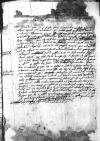List #3872
[Ioannes DANTISCUS] do [Samuel MACIEJOWSKI]Heilsberg (Lidzbark), [1539-08-01]
Regest polski:
Dantyszek nie jest zadowolony z nominacji Jana Sokołowskiego na kasztelanię elbląską. Uważa, że sprawa ta wzięłaby lepszy obrót, gdyby nie choroba adresata.
Dantyszek apeluje, by Maciejowski zadbał o zdrowie i nie obciążał się nadmiernie na niedawno objętym urzędzie kanclerskim. Przyjął bez zdziwienia brak skuteczności swojej rekomendacji dla adresata. Dziękuje za obietnicę wsparcia przeciw ludziom, którzy go zniesławiają.
Nawiązując do wcześniej przesłanych informacji, Dantyszek przypomina o niegodnym potraktowaniu biskupa chełmińskiego [Tiedemanna Giesego] przez pewnych jego krajan, a zwłaszcza przez wojewodę chełmińskiego [Jana Luzjańskiego]. Sprawę tę zarówno adresatowi, jak i królowi obszernie opisuje także Giese. Dantyszek prosi o wsparcie w tej kwestii. Informuje o przesłaniu przez Giesego wzorów, według których chciałby on, by sporządzone zostały królewskie poruczenia na najbliższy sejm [pruski], należące do nich pozwy i mandat przeciwko szlachcicowi z Ziemi Dobrzyńskiej [Moszczyńskiemu], który z jednej z biskupich wsi gwałtem uprowadził chłopa wraz z całym jego dobytkiem.
W związku z nawrotem zarazy w Ziemi Chełmińskiej, Toruniu i w sąsiednich miasteczkach Dantyszek nie jest pewien, czy sejm [pruski] zbierze się w dniu św. Michała [29 września]. Spodziewa się raczej eskalacji zarazy, gdyż trwają właśnie jarmarki gdańskie. Nawet wtedy, gdy zmieni się miejsce obrad na bezpieczniejsze, chorobę rozsiewać będą strony procesowe przybywające na zjazd z zainfekowanych terenów.
Dantyszek prosi, by Maciejowski zawiadomił króla, że przyjął zaproszenie księcia [Albrechta Hohenzollerna] na ślub córki swojego ochmistrza [Melchiora von Kreytzen]. Przy tej okazji mają przedyskutować sprawy dotyczące stosunków sąsiedzkich. Dantyszkowi nie wypadało odmówić, lecz martwi się, że wyjazd ten sprowokuje kolejne pomówienia na dworze.
Rękopiśmienne podstawy źródłowe:
Publikacje:
| ||||||||
Tekst + aparat krytyczny + komentarz Zwykły tekst Tekst + komentarz Tekst + aparat krytyczny Ekscerpty dotyczące podróży Dantyszka
Reverende Domine, frater et amice carissime et honorande paper damaged⌈[amice carissime et honorande]amice carissime et honorande paper damaged⌉.
Dominationi Vestrae Reverendae precor [...] paper damaged⌈[...][...] paper damaged⌉ navatam Dominatonis Vestrae Reverendae ex [...] paper damaged⌈[...][...] paper damaged⌉ ipsa intellexi, pro qua omnes [...] paper damaged⌈[...][...] paper damaged⌉ castellanatus Elbingensis adeo sit [...] paper damaged⌈[...][...] paper damaged⌉ dedecuisset morula quaedam in ea praesertim re [...] paper damaged⌈[...][...] paper damaged⌉ momenti habetur
Deo gra(tia), qui nobis Dominationem Vestram Reverendam salvam restituit. Quam ut sic longissimo tempore conservet, intime oro. Ceterum, mi Domine carissime, adnitendum curandumque esset, ne se in huius officii principio pluribus, quam humeri ferre valeant, oneret negotiis sollicitudinibusque non parum saluti hidden by binding⌈[i]i hidden by binding⌉ noxiis, illius diffinitionis
veter(is) or veter(um)⌈veter(is)veter(is) or veter(um)⌉
memor, quam olim a reverendissimo domino meo
Quod commendatio mea non admodum accepta fuerit, ob id aequiore animo fero, quod ab aliis prius maioribus me in rebus iustissimis et reipublicae commodis facta non semel repudiationem repperit ms. ceperit(!) ⌈repperitrepperit ms. ceperit(!) ⌉. Continuissem quidem me, quemadmodum et cor praesagiebat, si amor in Dominationem Vestram Reverendam reprimi potuisset, qui hoc ipsum, quod a me factum est, vehementia non modica extorsit. Boni itaque suscipiat, oro, quod bona et amica mens suggessit. Prodesse certe, obesse nolui, divina nihilosecius voluntas, quam non obscuris argumentis Dominationi Vestrae Reverendae propitiam esse nosco, irritis etiam osoribus fiet.
Patrocinium suum, quod mihi contra eos, qui me calumniari solent, offert, adeo gratum est, cum in the Dantiscus hand, superinscribed in place of crossed-out quam⌈quam cum cum in the Dantiscus hand, superinscribed in place of crossed-out quam⌉ exspectationi meae et in re praesenti iam non semel integerrime mihi responderit, ut quid gratius esse valeat, non facile a me inveniatur pro eoque gratias numquam intermorituras ms. intermerituras(!) ⌈intermoriturasintermorituras ms. intermerituras(!) ⌉ habeo sicque me vicissim erga Dominationem Vestram Reverendam geram, ne quid umquam, quod sibi a me praestari written over e⌈eii written over e⌉ velit, desiderare merito possit. Hocque non aulic{a}e etc.
In cf.  AAWO, AB, D. 7, f. 100r [...] paper damaged⌈[...][...] paper damaged⌉volentia reverendissimo domino Culmensi c[...] paper damaged⌈[...][...] paper damaged⌉rit aeque gratum immo et gratius [...] paper damaged⌈[...][...] paper damaged⌉ Dominatio Vestra paper damaged⌈[Dominatio Vestra]Dominatio Vestra paper damaged⌉ Reverenda commodaret.
AAWO, AB, D. 7, f. 100r [...] paper damaged⌈[...][...] paper damaged⌉volentia reverendissimo domino Culmensi c[...] paper damaged⌈[...][...] paper damaged⌉rit aeque gratum immo et gratius [...] paper damaged⌈[...][...] paper damaged⌉ Dominatio Vestra paper damaged⌈[Dominatio Vestra]Dominatio Vestra paper damaged⌉ Reverenda commodaret.
Quam diutissime incolumem paper damaged⌈[umem]umem paper damaged⌉ [...] paper damaged⌈[...][...] paper damaged⌉atus sui feliciorem esse summopere cupio.
Ex
Postscript:
De
Accedit et aliud, quod per Dominationem Vestram Reverendam serenissimam


